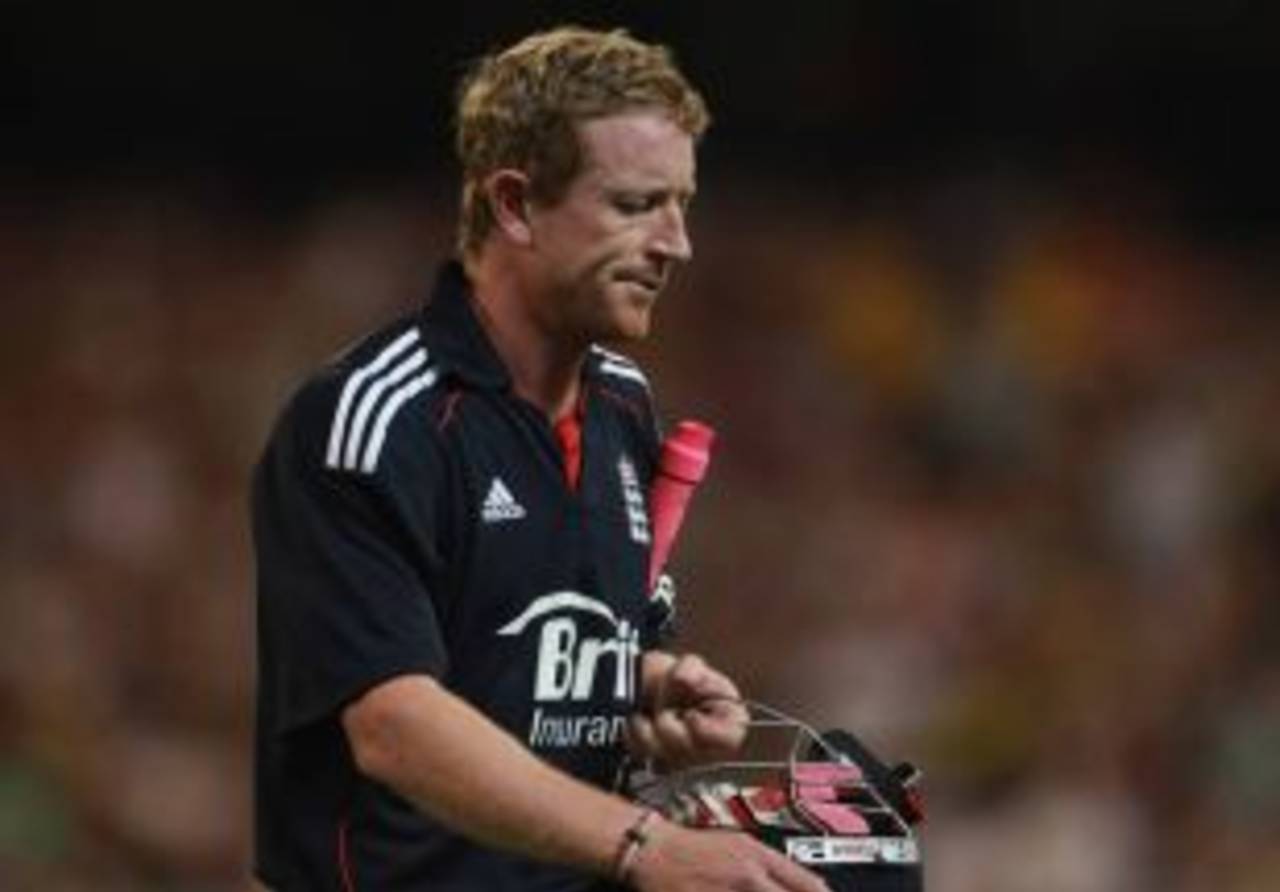Dropped Collingwood forced to fight back
Andy Flower and the England selectors have not been afraid to make big calls and Paul Collingwood is the latest victim
Andrew McGlashan
17-Jan-2011

Paul Collingwood: Out of form and out of the side • Getty Images
Andy Flower and the England selectors have not been afraid to make big calls. James Anderson didn't play in the World Twenty20, Kevin Pietersen was dropped last summer and Steven Finn left out during the Ashes after taking 14 wickets. They made another in Melbourne on Sunday when Paul Collingwood, England's most capped one-day player, was omitted for the first match against Australia.
Although Andrew Strauss said Collingwood remained firmly in their plans for the World Cup - the final 15-man squad will be named on Wednesday - he added that there would be no quick return. This omission wasn't dressed up as rotation or resting, this was a clinical dropping because Collingwood isn't currently part of England's best one-day side.
Michael Vaughan, a close friend of Collingwood, backed the decision to leave him out. "No colly looks a big call but with the way Bell and Trott are playing the right one," he wrote on Twitter.
From a form point of view it was an entirely logical step because Collingwood has had a shocking tour of Australia with 83 runs in five Tests followed by scores of 16 and 6 in the two Twenty20s where he was also captain. He also tailed off badly towards the end of the last English season, yet his ODI record remains impressive with 4978 runs at 36.07 and 106 wickets at 38.63.
There is an argument going around that the whole of last year was a write-off for Collingwood, but he still averaged 35.71 in 16 ODIs, although his bowling was less effective with just five wickets at 54.20. However, he has always been more than just about the numbers. What he lacks in natural ability is compensated for by fighting spirit. What was telling in Strauss's comments was that Collingwood needed to "clear his mind" because mental strength has made him.
He's bounced back before on numerous occasions, including four years ago in Australia where he suffered a significant form slump following his 206 at Adelaide. He then went 14 innings without a fifty before missing a match against Australia, in Sydney, due to illness. He returned for the following game against New Zealand, a shoot-out for a place in the CB Series final, and hit 106 which was followed by an unbeaten 120 and 70 in the two deciders against Australia.
Then there was the last time he was officially dropped, for the second Test against South Africa, at Headingley in 2008, following another lean run. He was recalled for the next match, at Edgbaston, and with his career hanging by a thread after a first-innings failure he hit 135 second time around. Collingwood is a man who knows how to fight back.
Both Flower and Strauss will be desperate for Collingwood to regain form and confidence because he can play a pivotal role over the next three months. They missed his bowling in the first ODI at the MCG, where little off-cutters would have been ideal for the slow surface, and similar conditions will be prevalent throughout the subcontinent. He also remains one of the best fielders in the world.
However, those two facets alone can't keep him in the side because he is there to score runs. There will be no sentiment or sympathy towards Collingwood and he wouldn't expect any, either, having always earned his rewards the hard way. Beyond one-day cricket there is Twenty20 to consider, even though England don't play another until the end of June, where Collingwood is also struggling to justify his place despite being captain.
Next April, England will defend their Twenty20 crown in Sri Lanka and it could provide an ideal finishing point for Collingwood's international career. Now it doesn't look quite so certain that he will make it that far. Collingwood ended Test cricket on his own terms, but the rest of his England career may be more out of his control.
Andrew McGlashan is an assistant editor at ESPNcricinfo